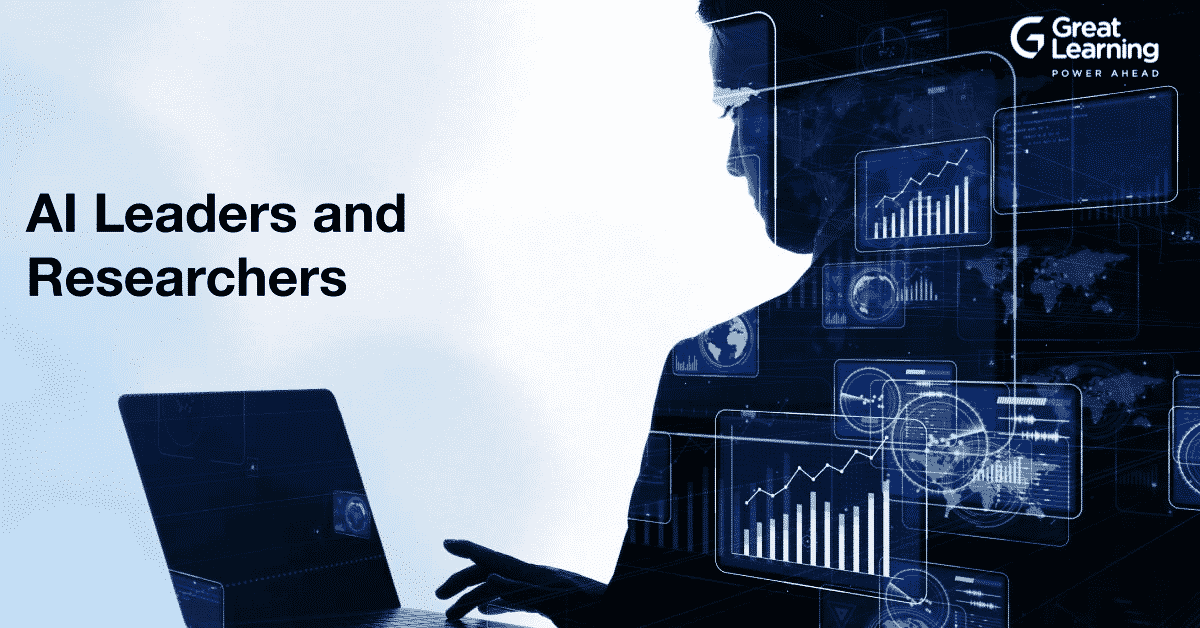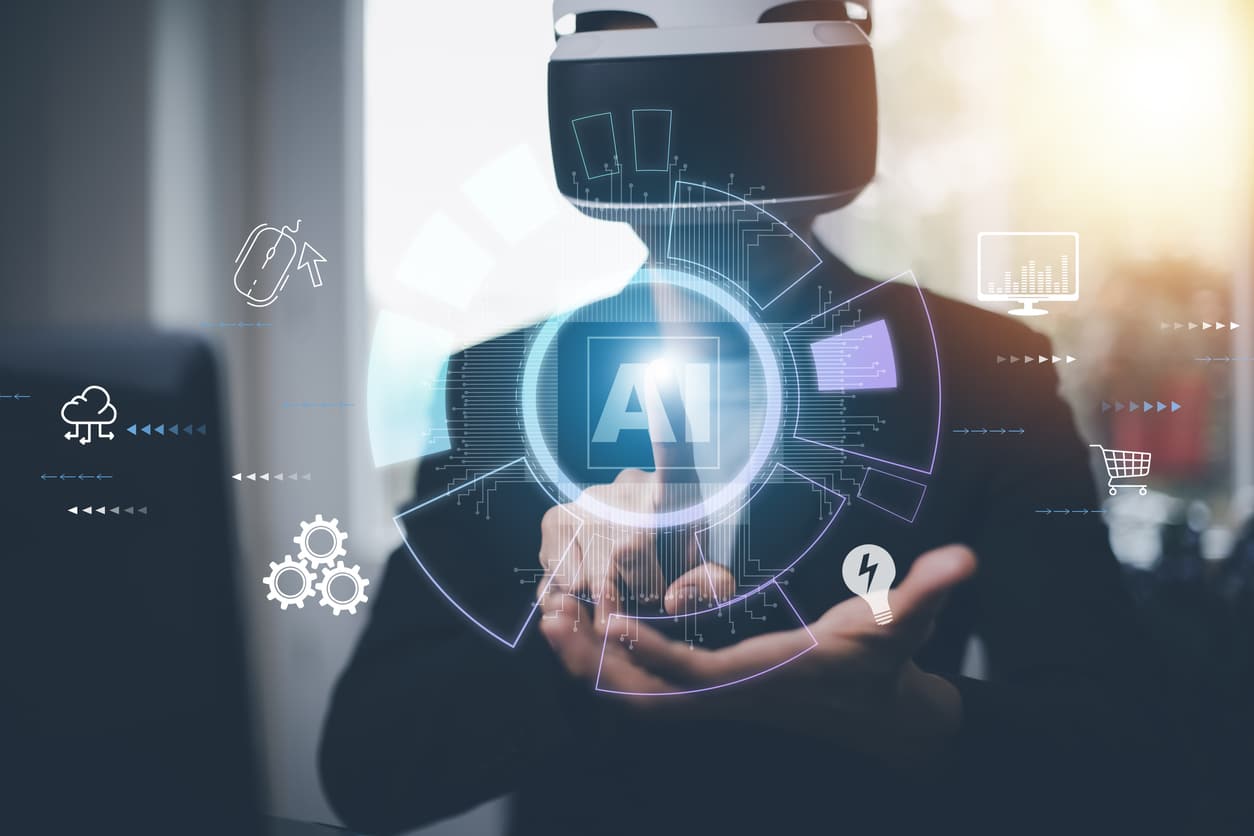About AI Leaders
Deep learning continues to produce advanced techniques with widespread applications faster than one can keep up with. Dozens of papers get uploaded to arXiv every day, and there are hundreds of scientists and engineers active in the field. To stay in the loop, we’ve put together a list of 12 innovators and researchers in the field that you could follow to know the progress brought by the discipline to science, industry and society. The list includes links to the website, LinkedIn, Twitter account, Facebook profile and Google Scholar Profile of the AI Leaders for you to follow.
Top 12 AI Leaders and Researchers
These are the top 12 AI Leaders list to watch in 2022
- Andrew Ng
- Fei-Fei Li
- Andrej Karpathy
- Demis Hassabis
- Ian Goodfellow
- Yann LeCun
- Jeremy Howard
- Ruslan Salakhutdinov
- Geoffrey Hinton
- Alex Smola
- Rana el Kaliouby
- Daphne Koller
Post Graduate Program in Artificial Intelligence for Leaders
Turn insights into action—use AI to make faster decisions, optimize teams, and lead digital transformation.
1. Andrew Ng
Founder and CEO of Landing AI, Founder of deeplearning.ai.
Website: https://www.andrewng.org, Twitter: @AndrewYNg, Facebook: Andrew Ng, Google Scholar.
Andrew was a co-founder and head of Google Brain. He was also the Chief Scientist at Baidu and led the company’s AI group. He is a pioneer in online education as a co-founder of deeplearning.ai and Coursera - the world’s largest MOOC platform, which started off with more than 100,000 students enrolling for his popular courseCS229A. Dr Ng has touched countless lives through his work as a computer scientist which led to him being named as one of Time magazine’s 100 most influential people in 2012.
Dr Ng’s research is mainly in fields such as Machine learning, deep learning, computer vision, machine perception and natural language processing. His papers which frequently won the best paper award at academic conferences, eventually made him hugely popular and influential among computer scientists and had a massive influence in the field of AI, robotics and computer vision.
Some of his most well-known work as one of the top AI Leaders include his Autonomous Helicopter Project at Stanford and the Stanford Artificial Intelligence Robot project, which ended up producing an open-source robotics software platform that is widely used today. The Google brain project, which he founded in 2011, used artificial neural networks that were trained using deep learning. The distributed computer with 16,000 CPU cores learnt how to recognize catches from watching YouTube videos and not being taught what a cat really is. The technology which comes from the project is still used in the speech recognition system of Android Operating Systems.
2. Fei-Fei Li
Sequoia Professor of Computer Science Stanford University
Stanford Profile, Twitter: @drfeifei, Google Scholar.
Dr Fei-Fei Li is the inaugural Sequoia Professor in the Computer Science Department at Stanford University. She is also the Co-Director of the Stanford Institute for human-centred Artificial Intelligence and a Co-Director of the Stanford Vision and Learning Lab. She was the Vice President at Google from Jan 2017 to September 2018 and served as the Chief Scientist in Artificial Intelligence/ Machine Learning at Google Cloud.
Dr Li currently works in areas such as cognitively inspired AI, deep learning, machine learning, computer vision and Artificial Intelligence in healthcare that focuses on ambient intelligence systems. She has published more than 200 scientific articles in all the major journals and conferences and has also worked on cognitive and computational neuroscience in the past. ImageNet, an invention of Dr Li, is an important massive dataset and benchmarking drive responsible for expanding the latest frontiers of Artificial Intelligence and deep learning.
Along with her technical contributions to the field, she is also a leading voice at the national level for advocating for diversity in AI and STEM. Dr Li is the chairperson and co-founder of AI4ALL, which is a non-profit focused on diversity and inclusion in AI education. She has received numerous awards and recognition for her work, including the ELLE Magazine’s 2017 Women in Tech, a Global Thinker of 2015 by Foreign Policy and the prestigious “Great Immigrants: The Pride of America” by Carnegie Foundation in 2016.
3. Andrej Karpathy
Senior Director of Artificial Intelligence at Tesla
Website: https://karpathy.ai, Twitter: @karpathy, Google Scholar.
Andrej Karpathy leads the team working on the neural networks of the Autopilot in Tesla’s cars. He worked previously at OpenAI as a research scientist on Deep Learning in Computer vision, Reinforcement Learning and Generative Modeling. Andrej worked with Fei-Fei Li for his PhD at Stanford, where he worked on Convolutional/Recurrent Neural Network architectures and their applications in Natural Language Processing and Computer Vision and their intersection. He also interned at Google working on large scale feature learning over YouTube videos. Andrej was the primary instructor at the Stanford class on Convolutional Neural Networks for Visual Recognition (CS231n), which he designed together with Fei-Fei. The Deep Learning Course was a huge success, with the number of students enrolled at 150 in 2015 to 750 in 2017.
Andrej is active on social media, with 352.4K followers on Twitter. He is an enthusiastic blogger and is the developer of Deep Learning libraries in javascript. He also spends his spare time maintaining Arxiv, which is home to over 100,000 papers on machine learning accumulated over the last six years.
4. Demis Hassabis
Co-founder and CEO of Deep Mind
Website: https://deepmind.com/about#leadership, Twitter: @demishassabis, Google Scholar.
Demis Hassabis co-founded DeepMind, which is an Artificial Intelligence company inspired by neuroscience. Deep Mind was bought by Google in 2014 in their largest acquisition in Europe to date. Demis is now the Vice President of Engineering at Google DeepMind. He is the lead of all the general Artificial Intelligence efforts at Google and even the program AlphaGo which was the first ever to beat a professional at the game of Go. Deep Mind has contributed significantly to advancements in machine learning and produced several awards winning papers.
As a former chess prodigy, Demis had an early start in the gaming industry by finishing the simulation game Theme Park at the age of 17. He graduated from Cambridge University in Computer Science and founded Elixir Studios, a pioneering video games company that produced award-winning games. He returned to academia for a PhD after a decade of leading successful technology startups. He completed his PhD in Cognitive neuroscience at University College London and post-doctorates at MIT and Harvard.
Demis, as one of the top AI Leaders, worked in the field of autobiographical memory and amnesia, where he was the co-author of a number of papers that were influential in the field. His work on the episodic memory system, which relates to memory and imagination, received widespread coverage in the media. It was also listed as one of the top 10 breakthroughs of the year by the journal Science.
5. Ian Goodfellow
Director of Machine Learning at Apple
Website: https://www.iangoodfellow.com/, Twitter: @goodfellow_ian, Google Scholar.
Ian is known in the field as a researcher in machine learning. He currently works for Apple as the director of machine learning. He was formerly a research scientist at Google brain and has made a number of contributions to the field of deep learning.
Ian got his B.S. and M.S. in computer science from Stanford University, where he was under the supervision of Andrew Ng. He earned his PhD in the April of 2014 from the Université de Montréal, where he was under the supervision of Yoshua Bengio and Aaron Courville. After graduating, Ian joined Google, where he worked as part of the research team of Google brain. He then quit Google to join Open Ai, which was then still a new institute. In 2017 Ian returned to Google Research.
Ian is the lead author of the textbook Deep learning and is most known for the generative adversarial networks that he invented. As part of his work at Google, he developed a system to enable automatic transcription of addresses from photos taken by Street View cars in Google Maps. He also demonstrated vulnerabilities in machine learning systems. The MIT Technology Review cited Ian Goodfellow as one of the 35 Innovators Under 35 in 2017. He was also listed as one of the 100 Global Thinkers by Foreign Policy in 2019.
6. Yann LeCun
Chief AI Scientist at Facebook
Website: https://research.fb.com/people/lecun-yann/, Twitter: @ylecun, Google Scholar.
Yann LeCun is a computer scientist primarily known for his work in the field of machine learning, mobile robotics, computer vision, and computational neuroscience. Some of his more popular contributions are in optical character recognition and computer vision that uses convolutional neural networks. He is the founding father of convolutional nets and one of the primary creators of DjVu, an image compression technology. Yann LeCun received the Turing Award in 2018 along with Yoshua Bengio and Geoffrey Hinton for their contribution to Deep Learning.
Some of LeCun’s well-known works include his machine learning methods. His Convolutional Neural Networks was a biologically inspired image recognition method which he applied to optical character recognition and handwriting recognition. Out of his work came the bank check recognition system that was used by NCR and other companies through which 10% of all checks in the United States passed in the later 1990s and early 2000s.
LeCun joined AT&T Labs in 1996 as the head of the image processing research department. He worked mostly on the DjVu image compression technology, which would eventually be used by many websites to distribute scanned documents, with the Internet Archive being the most notable site.
In 2012 LeCun became the founding director of the NYU Center for Data Science, and in 2013 he joined Facebook as the first director of AI research.
7. Jeremy Howard
Founding Researcher at fas.ai
Website: https://www.fast.ai/about/#jeremy, Twitter: @jeremyphoward
Jeremy Howard is an entrepreneur, developer, business strategist and educator. He is well known as the founding researcher at fast.ai and a Distinguished Research Scientist at the University of San Francisco. He was previously the founder and CEO of Enlitic, the first company to apply deep learning to the field of medicine. Its success made it to MIT Tech Review’s world’s top 50 smartest companies for two years in a row.
Jeremy’s career started as a management consultant at McKinsey & Company, where he remained for eight years before moving on to entrepreneurship. He then became the co-founder of FastMail in 1999, which was sold to Opera Software. FastMail, which was highly successful in Australia, was the first of its kind to allow users to integrate their known desktop clients. Later, he joined the online community of data scientists Kaggle as President and Chief Scientist. The company fast.ai, which he co-founded with Rachael Thomas, is a research institute that is focused on making Deep Learning more accessible to everyone.
Howard’s company Enlitic was a pioneer in the field of medicine, where it made a medical diagnosis and improved process accuracy and speed by applying machine learning. The deep learning algorithms used by Enlitic can diagnose disease and illnesses, and Howard believes they can be as good or even outperform humans at the task. Jeremy appears regularly on Australia’s news programs and has created numerous tutorials on data science and web development.
8. Ruslan Salakhutdinov
Associate Professor, Carnegie Mellon University
Website: http://www.cs.cmu.edu/~rsalakhu/, Twitter: @rsalakhu
Ruslan Salakhutdinov is a Computer Science professor in the Machine Learning Department at Carnegie Mellon University and has previously held the position of the Director of AI Research at Apple. He specializes in the field of statistical machine learning, and his research interests include deep learning, probabilistic Graphical Models and Large-scale optimization, in which he has published papers.
Salakhutdinov earned his PhD in machine learning from the University of Toronto in 2009. He spent two years on his postdoctoral at the Artificial Intelligence Lab at Massachusetts Institute of Technology, after which he joined the University of Toronto’s Department of Computer Science and Department of Statistics as an assistant professor. He has received numerous awards such as the Connaught New Researcher Award, Early Researcher Award, Microsoft Research Faculty Fellowship, Alfred P. Sloan Research Fellowship, Google Faculty Research Award and Fellow of the Canadian Institute for Advanced Research.
9. Geoffrey Hinton
Computer Science Professor at University of Toronto
Website: http://www.cs.toronto.edu/~hinton/, Twitter: @geoffreyhinton, Google Scholar.
Geoffrey Hinton is one of the most famous AI Leaders in the world, with his work specializing in machine learning, Neural networks, Artificial intelligence, Cognitive science and Object recognition. Hinton is a cognitive psychologist and a computer scientist who is most known for his work on artificial neural networks. As a leading figure in the deep learning community, Hinton has divided his time working for Google Brain and the University of Toronto since 2013. AlexNet-an image recognition milestone which was designed with collaboration with his students, was a breakthrough in the field of computer vision. In 2018 Hinton received the Turing award along with Yann LeCun and Yoshua Bengio for their work on deep learning. The trip is often referred to as the “Godfathers of Deep Learning” or the “Godfathers of AI”.
Hinton’s work looks into different ways neural networks can be used for machine learning, symbol processing and memory perception. He has over 200 peers reviewed publications that he has authored or co-authored. What distinguishes his work on artificial neural nets internationally is now they can learn by themselves without a human teacher. The research gives one of the first glimpses into brain-like structures that are truly autonomous and intelligent. Through his work, Hinton has found similarities between broken nets and brain damage which leads to the loss of names and characterization. His work also examines mental imagery and comes up with puzzles that test creative intelligence and originality.
Hinton received his Honorary Doctorate from the University of Edinburgh in 2001, and he was also the recipient of the IJCAI Award for Research Excellence lifetime-achievement award in 2005.
10. Alex Smola
Director, Amazon Web Services
Website: http://alex.smola.org, Twitter: @smolix, Google Scholar.
Alex Smola has been the director of machine learning at Amazon Web Services since 2016. His work focuses on machine learning, statistical data analysis, computer vision, deep learning and NLP to design tools for data scientists. Alex is an author for over 200 papers, edited five books and guided many PhD students and researchers. His primary interests are in deep learning, scalability of algorithms, statistical modelling and applications in document analysis, user modelling and many more.
Alex received his master's degree at the University of Technology, Munich, in 1996. He earned his doctoral degree at the University of Technology Berlin in computer science in 1998. He worked subsequently as a researcher at the IDA Group and the Australian National University’s Research School for Information Sciences and Engineering. He has also worked with tech giants such as Yahoo and Google as a researcher and taught at Carnegie Mellon University. In 2015 Alex co-founded the Marianas Labs and moved to Amazon Web Services in 2016 to build Artificial Intelligence and Machine Learning tools for the company.
Alex as an AI leader is always on the lookout for talented interns and team members who are skilled at writing code, working with deep learning, writing efficient algorithms and are familiar with high-performance computer systems.
11. Rana el Kaliouby
CEO and Co-Founder of Affectiva
Website: https://www.ted.com/speakers/rana_el_kaliouby , Twitter: @kaliouby, Google Scholar.
Rana el Kaliouby is a pioneer in artificial intelligence and the founder and CEO of Affectiva. Her company which is the spinoff of an MIT media lab aims to integrate emotional intelligence into the digital experiences of users everywhere. She is the head of the emotions analytics team that has worked to develop emotion-sensing algorithms. They have also mined the largest database in the world on emotions and have put together 12 billion data points from videos of 2.9 million volunteers spread across 75 countries. The platform is used by many leading companies around the world to get metrics on consumer engagement. They are pioneering digital apps that are emotion-based for entertainment, enterprise, video communication and online education.
Rana earned her PhD from Cambridge University, after which she joined as a research scientist at MIT media labs. She was instrumental in the application of emotion recognition technology in a number of different fields, including mental health. She quit MIT to co-found Affectiva, which is a pioneer in the field of Emotion AI. As an AI leader in the domain, it now works with 25% of the Fortune 500 companies.
Forbes named Rana in their list of America’s Top 50 Women in Tech while she was included in the list of 40 under 40 by Fortune. Rana speaks frequently on the topic of ethics in Artificial intelligence and overcoming biases. Her mission is to integrate artificial emotional intelligence to ‘humanize technology’ and develop deep learning platforms for various aspects of emotions such as facial expressions and tone of voice to understand how users are feeling.
12. Daphne Koller
Co-Founder of Coursera, Founder and CEO of insitro.
Website: https://ai.stanford.edu/~koller, Twitter: @DaphneKoller, Google Scholar.
Daphne is a computer scientist and a professor in the Department of Computer Science at Stanford University. She is most popularly known as the co-founder of Coursers, the world’s largest MOOC platform. Her primary research area is artificial intelligence and its application in biomedical sciences. Her work focuses on concepts such as decision making, inference learning and representation in applications pertaining to computer vision and computational biology.
Daphne launched Coursera together with Andrew Ng in 2012, in which she served as co-CEO along with Ng. She then took up a role as President of Coursera and was recognized as Time magazine’s 100 most influential people in 2012. In 2014 she was also on the Fast Company’s Most Creative People 2014. In 2016 she left Coursera to become the chief computing officer at Calico. She later moved on in 2018 to start Insitro, which is a drug discovery startup. In 2009 she co-authored a textbook on probabilistic graphical models. She later offered the subject as a free online course in February of 2012.
Conclusion
While this list doesn’t encompass the tremendous contributions of other giants in the field, it is sorted on the basis of the Twitter followers these leaders have online. With that said, there is much depth to be explored in the contributions of these 12 AI leaders, who also happen to have a lot of overlap in their research, work and interactions.
In the rapidly evolving field of artificial intelligence, continuous learning is crucial. Explore our online courses with certificates that can help you stay ahead in your career and enhance your skills.
Take up the PGP - Artificial Intelligence for Leaders Course by Great Learning and power ahead your career today. Learn from the best in the industry through Live Online Classes.






